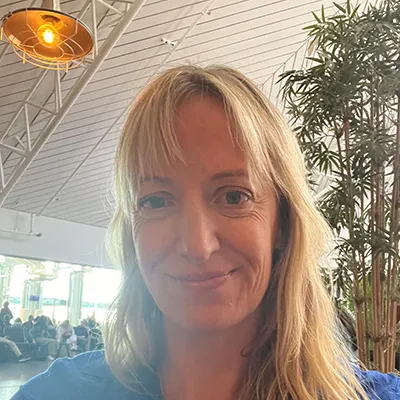Senior Lecturer
A senior lecturer is an academic paramedic who has completed, or is close to completing, a relevant master’s level qualification. They take on additional responsibilities such as designing curricula, leading on quality assurance, or managing admissions, while also starting to develop their own research profile. They may also act as mentor and supervision of junior colleagues within the team.
In some institutions, a senior lecturer may also serve as a program lead, overseeing and developing an entire course of study and leading an academic team. Depending on the institution, a senior lecturer may progress to higher roles, such as principal lecturer, associate dean, or associate head of school, demonstrating leadership, management, and educational expertise.
Case studies
Use the case studies below to learn more about the experiences of different individuals.
A person’s role may start to develop more formally into the other quadrants. Each person has a pie chart showing how much of the different quadrants is involved in their role.
Below is the colour code for each quadrant:
Education
Leadership & Management
Research & Development
Clinical Practice
Education
Leadership & Management
Research & Development
Clinical Practice
Paul Williams
ACP and lecturer at York Uni
(values below tbc)
60%
10%
10%
Matt Capsey
Senior Lecturer
60%
0%
0%
40%
Ursula Rolfe
Deputy Head of Department and Associate Professor
60%
Ursula Rolfe
Job title: Associate Professor Paramedic Science, Deputy Head of Department, Faculty Lead for Simulation and National Mental Health Lead for College of Paramedics.
Entry route: IHCD

What steps did you take in your professional journey to obtain your current position?
After working in SWASFT as a training officer and being seconded into Bournemouth University this fuelled an even greater interest in paramedic education. I also decided that I needed to upgrade my own skills and education levels as a paramedic and studied for my specialist paramedic qualification part time. Once the study bug had bitten it was difficult to shake and when I stepped into the role of programme lead at Bournemouth University, I signed up to do my PhD shortly after my son was born. I never expected to like research but because my topic (how paramedics manage patients experiencing mental health issues) actually developed out of my clinical experiences and talking to other paramedic colleagues, my journey at PhD level has been extremely interesting and difficult! I then applied for the role as programme lead for the innovative and collaborative MSc in Trauma Sciences at University of Southampton. During these academic years I also became involved with the College of Paramedics not only working on the curriculum documents since 2012 but then taking on the Mental Health Lead role, as a volunteer. After three years at the University of Southampton I had the opportunity to move back to Bournemouth University and am now Deputy Head of Department for Midwifery and Health Sciences as well as Simulation Lead for the Faculty. After highlighting the fact that paramedics need more support in managing mental health patients and working on a variety of projects to support this important subject area- including publishing my book (Mental Health Care in Paramedic Practice), I was most recently appointed as Associate Professor in Paramedic Science in 2023. After starting out as a clinical tutor I am now able to present my research findings at international conferences and my passion remains strong in supporting my clinical paramedic colleagues around how they can manage mental health patients.

What does your typical working week/day look like?
I am very passionate about my work and I definitely work well outside office hours but my role offers flexibility that I would not have in the NHS and I am grateful for that. I work mainly from the university and at times from home. Travel is mainly for conferences and presenting my research. My work week varies greatly because I have 3 roles: Associate Professor/Deputy Head of Department and Faculty Simulation Lead. This means there are times where my research takes precedent due to bidding deadlines as Associate Professor. I also mentor other staff members to help increase their research profile and work on primary research and grant writing. The same can be said for my deputy head role, there are times in the academic calendar where we have line management and leadership deadlines to meet as well as teaching heavy times and marking. As the simulation role represents the Faculty I try to create space for at least 10-15 hours a week for this. This is a vocation for me and trying to make an impact in this profession is a privilege. Balancing work and life is important and I confess an area I can work on improving!

What is your favourite thing about your role?
What really matters most to me is helping my clinical paramedic colleagues manage mental health patients in a way that serves all involved in a better way. It started from my feelings in clinical practice and has continued to develop from there, doing my PhD on this subject area and then writing a book on it has been hugely rewarding on a personal and professional level. It is also a privilege to teach and help develop the future paramedic workforce. It is a gift to be able to share and exchange knowledge and to help our profession grow and develop.

What about your role is most challenging?
Although I am very organised I find the bid and grant writing aspects of my research role stressful in terms of meeting deadline especially when you have larger collaborations - but when you are successful there is no better feeling! Because I love my 'job' ( I prefer to call it a vocation) so much, my personal life often suffers and I know this is an area I need to work on. There is much opportunity to make a real difference and our profession is growing exponentially.

What advice would you give to others aspiring to reach your position?
Never say no to an opportunity even if it scares you. I never dreamed of doing a PhD, never mind completing one and becoming actively involved in research. This is actually my second career, I used to be a journalist and editor. Don't let anyone dissuade you of what you truly feel is your passion. I moved countries to fulfill my potential and looking back, despite some really tough times and some even tougher career decisions...I have no regrets. I am exactly where I should be.

